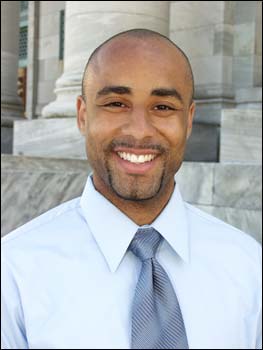"Medicine and Social Justice" Topic of Ewing Lecture

KEENE, N.H. 10/13/05 - In a reflection of his work with Partners in Health in rural communities in Haiti, Dr. David Walton wrote, “I came to realize that the poor deserve preferential treatment. Diseases settle on the poor because they have been forced to endure hunger, famine, political violence, and social inequality.”
Tuberculosis, cholera, and malaria are all but unknown in the West. Yet these treatable and preventable diseases are among the major causes of mortality in poor and developing nations.
Dr. Walton, a resident at Brigham and Women’s Hospital in Boston and a volunteer for the international charity organization Partners in Health, will speak at Keene State College’s fourth annual James D. Ewing World Affairs Lecture. The event, which is free and open to the public, will be held on Friday, November 4, at 4 p.m. in the Mabel Brown Room of the Student Center. The lecture is part of KSC’s Fourth Biennial World Affairs Symposium “Globalization: Impact on Peoples of the World,” which will be held November 3-5.
Dr. Walton divides his time between Boston and Haiti, where he works with Partners in Health, which provides direct health care services and undertakes research and advocacy activities on behalf of those who are sick and living in poverty. In his address, “Medicine and Social Justice,” Dr. Walton will discuss his work for Partners in Health: diagnosing and curing infectious diseases and bringing modern medicine to those who need them most - those living in poverty.
The James D. Ewing World Affairs Lecture Endowment is named in memory of James Ewing, who was the owner and publisher of The Keene Sentinel from 1954 to 1993. The Endowment was established to bring speakers to Keene State College and the Keene community to address current public or world affairs issues.
Dr. Paul Farmer founded Partners in Health (PIH) in 1987, initially to support local community health activities in Central Haiti by providing clinic and a training program for community health workers. Today, PIH provides medical services to the poor of Haiti, Rwanda, Peru, Russia, and Boston.
Between his first and second years of medical school, Dr. Walton spent several months working at the hospital in Cange, on Haiti’s Central Plateau, run by PIH’s sister organization Zanmi Lasante. He wrote, “My experience there was unlike any of my previous experiences abroad. The abject poverty and despair I witnessed is unparalleled in the western hemisphere. Haiti humbled me, brought tears to my eyes, and lit a fire in my heart.” The 60 days he stayed in Haiti, he wrote, “were the most important of my life.”
During that time, Dr. Walton served as Paul Farmer’s research assistant, accompanying the doctor on house calls - via full-day, arduous treks through mountains. On each visit they encountered patients with illnesses that would be easily and, by Western standards, affordably treated with state-of-the-art medicines. But, says Dr. Walton, many Haitians, burdened over the years with corrupt governments and natural disasters, cannot afford food, let alone pay for medicine. Farmer’s solution: to ignore expensive, name brand drugs and scour the world for cheaper, but just as effective, generics. With these medicines, Zanmi Lasante and PIH provide over 1,000 patients daily with free, quality medical care. Equally important, they work together to provide local residents with specialized health training as pharmacists, birth attendants, and community health workers, and to arrange more advanced training for physicians and nurses.
By finding innovative solutions to medical problems that afflict mainly the poor, PIH is also attempting to change the Western view of health care, says Walton. In 2001 Brigham and Women’s Hospital, in collaboration with PIH, created the Division of Social Medicine and Health Inequalities (DSMHI), an institution dedicated to addressing disparities in health through training, education, research, and service. Dr. Walton was one of the first candidates to be selected for the DSMHI’s Howard Hiatt Residency in Global Health Equity and Internal Medicine at Brigham and Women’s Hospital. He has been working with Partners in Health since 1997.
Keene State has a further connection with the work of Partners in Health. Mountains Beyond Mountains: The Quest of Dr. Paul Farmer, a Man Who Would Cure the World, by Tracy Kidder, was this year’s Summer Reading Program text at the College. Kidder will speak at KSC during the spring semester.
For more information, contact Irene Herold, director Mason Library, at 603-358-2723.





